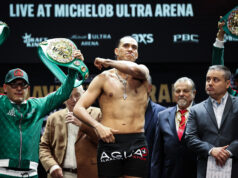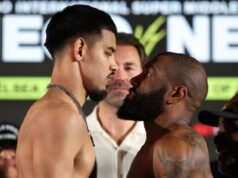Referees know they have done a good job if nobody remembers their name. Poor Russell Mora. Mora lost his anonymity and gained some infamy for his work, or lack of it, in Abner Mares’ majority decision over Joseph Agbeko.
By now, the controversy has been played and re-played, analyzed and re-analyzed, ad infinitum in the days since Mares threw repeated low blows, was warned five times, yet never penalized by Mora, the fight’s biggest loser Saturday at Las Vegas’ Hard Rock Hotel & Casino. Another review of the tarnished fight for the International Boxing Federation’s title in Showtime’s bantamweight tournament would be just another low blow.
But I couldn’t help but wonder, perhaps marvel, at the relative lack of controversy about referees in a sport full of noisy arguments about virtually everything else. Other than a cop on streets that might as well be the front lines in a tough neighborhood, there can’t be a job much more challenging than that of a fight referee. Controlled violence is an oxymoron if there ever was one. But even anarchy has rules, and it’s up to the referee to enforce them. Mora didn’t.
In an internet court full of opinion and not much accountability, Mora has been charged with incompetence, bias and a whole raft of other misdeeds. Take your pick. But it is a multiple-choice question without a proven answer. There are plenty of other questions
For one, there was no response from Agbeko when it was clear that the rules would not be enforced. Retaliation for an uncalled low-blow is about as fundamental as a jab. If Agbeko had thrown just one, he might have been able to restore order and his chances. He didn’t.
I can only wonder what he and his corner were doing, or not doing, while Mora repeatedly missed the obvious. It also makes me wonder whether no response from Agbeko is a flaw that would lead to another loss if a rematch within 120 days, as ordered by the IBF, in fact happens. On Anarchy Street, it is always wise to be skeptical about whether any order will ever be carried out.
Curious, too, is the absence of pre-fight controversy that actually might have helped avoid the Mora flap. Yahoo’s Kevin Iole reported Monday that Dana Jamison, operations director for Agbeko promoter Don King, objected to Mora. According to Iole’s story, King said he got a call from somebody who told him that Mora was “a Golden Boy referee.’’ Mares is a Golden Boy Promotions fighter. The Nevada State Athletic Commission reportedly heard the complaint, but did not assign a different ref.
Would Mora have acted differently if news of Jamison’s objection had been disclosed? Maybe not. But I can’t help but recall Bernard Hopkins well-publicized threat to withdraw from his 2007 rematch with Robert Allen in tuneup for is victory over Oscar De La Hoya, now Golden Boy’s president. Hopkins objected to the assignment of referee Joe Cortez, arguing that Cortez might have bias against him. Hopkins was worried that Cortez, a Puerto Rican, might have grudge against Hopkins, who ripped Puerto Rico before his upset of Felix Trinidad in 2001.
Hopkins, now a Golden Boy fighter, has never been afraid of throwing the race card. And, yeah, he’s also never been shy about grandstanding. The fight went off with Cortez as the ref. Cortez’ work was never an issue. Hopkins was a much better fighter than Allen and proved throughout every round of unanimous decision.
Had the fight been close, however, Hopkins’ objection might have served as some insurance against any chance that Cortez would have swung the scorecards in favor of Allen. As only he can, Hopkins broadcast his concerns to the court of public opinion, meaning fans and state regulators were watching Cortez’ every move.
None of this is to say that Nevada or any other state commission should seek approval from camps about a ref’s assignment. That would open the proverbial Pandora’s Box to a whole host of suspicions about influence peddling. But it is in the best interest for a promoter, manager, trainer or the fighter himself to make their objections know before, not after, opening bell.
Quotes, anecdotes
· Despite his surprising performance against Marcos Maidana in April, Erik Morales, a loser in five of his last eight fights, still had to defend himself in a conference call Wednesday that also included his next opponent, Lucas Matthysse, on the undercard of Floyd Mayweather Jr.-versus-Victor Ortiz on Sept. 17 at Las Vegas’ MGM Grand. Morales was asked: Why still fight? “Not only can I say it; I can do it’’ said Morales, who has been at it for nearly two decades. “I also love proving people wrong.’’
· Matthysse, an Argentine, returns to the United States after suffering two controversial losses by split decision in the U.S. – Zab Judah in New Jersey and Devon Alexander in Missouri. “Everybody knows that those two losses were bad decisions,’’ he said. “I was robbed in those fights.’’
AZ Notes
· Just guessing, but Jesus Gonzales’ chances at fighting Kelly Pavlik might have improved after Pavlik angered Top Rank by abruptly withdrawing from his last bout in frustration over a proposed purse against Lucian Bute. Before long, Pavlik might have to turn to Gonzales to get a fight. There were reports about slow ticket sales among Pavlik’s disaffected fan base in Youngstown, Ohio. Pavlik-Gonzales might be a better draw in Phoenix, where Gonzales is still popular.
· Former World Boxing Organization heavyweight champ Sergei Liakhovich (25-3, 16 KOs), a Scottsdale resident, packs his bags for Germany Saturday for a fight at saving his career on Aug. 27 against Robert Helenius (15-0, 10 KOs) in a bout televised by EPIX. Liakhovich is back with trainer Kenny Weldon, who was with him when he won the WBO title against Lamon Brewster and lost it to Shannon Briggs in the last second of the last round of his first defense. “Kenny and I are on the same page,’’ Liakhovich said.









